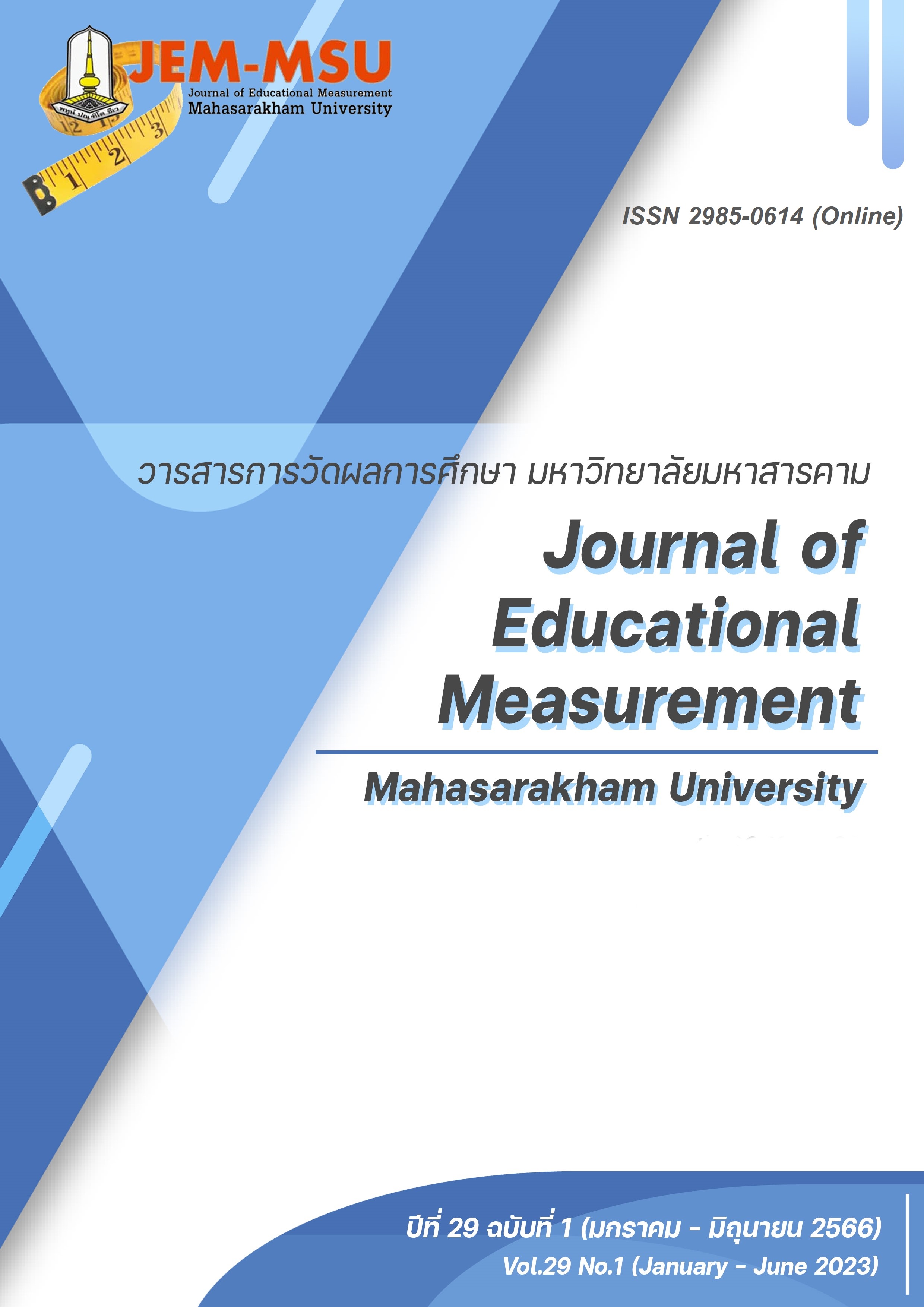CIPPI Model for Curriculum Evaluation: Master of Education in Teaching of Science and Mathematics, Faculty of Education, Mahasarakham University
Main Article Content
Abstract
This research aimed to evaluate the Master of Education Curriculum in Teaching of Science and Mathematics (Revised Version A.D. 2017) of the Faculty of Education, Mahasarakham University, and to study guidelines for revision of the Master of Education Curriculum in Teaching of Science and Mathematics. This research was evaluation research, using the decision-oriented CIPPI model based on Stufflebeam. The sample consisted of 113 informants who were students, faculty’s members responsible for the curriculum and teaching staff, master’s degree graduates, and graduate’s employers. The instruments for data collection were an interview form and a questionnaire. The analysis of data employed percentage (%), mean (), standard deviation (
) and content analysis. The results were classified according to the components of the evaluation as follows:
1) The context of the curriculum, as a whole, was appropriate at the high level. When each component was considered, it was found that the curriculum objectives and structure were appropriate at the high level. Meanwhile, the course descriptions were appropriate at the highest level. However, some courses had overlapping content that should be reduced. So, the similar content in courses should be improved and be made consistent with the needs of students and the present situations.
2) The input of the curriculum, as a whole, was appropriate at the high level. When each component was considered, it was found that the course entry process, study resources and materials were appropriate at the high level. Meanwhile, the teaching staff were appropriate at the highest level. Suggestions were made on some sub-components as follows: there should be more advice on accessing data sources and different learning sources, on doing thesis, and on the Internet system.
3) The process of the curriculum, as a whole, was appropriate at the high level. When each component was considered, it was found that the learning management, practicum and extracurricular activities were appropriate at the high level. Meanwhile, doing thesis was appropriate at the highest level. The suggestion was: projects for student development on different aspects should be organized continuously throughout the curriculum.
4) The product of the curriculum, as a whole, was appropriate at the high level. When each component was considered, it was found that the virtuous and ethical characteristics, interpersonal relation skills, numerical analysis skills, communication and information technological skills were appropriate at the high level. Meanwhile, knowledge and understanding of the profession and major, cognitive skills, learning management skills and ability to do research were appropriate at the highest level. All of these findings indicated that the curriculum was accepted as being able to produce graduates well.
5) The impact of the curriculum, as a whole, was appropriate at the highest level. When each component was considered, it was found that the graduate employers were satisfied with the graduates’ performance at the highest level in every component. The suggestion was: the curriculum should prioritize issues relating to approaches in students’ professional development.
Article Details

This work is licensed under a Creative Commons Attribution-NonCommercial-NoDerivatives 4.0 International License.
The content and information contained in the published article in the Journal of Educational Measurement Mahasarakham University represent the opinions and responsibilities of the authors directly. The editorial board of the journal is not necessarily in agreement with or responsible for any of the content.
The articles, data, content, images, etc. that have been published in the Journal of Educational Measurement Mahasarakham University are copyrighted by the journal. If any individual or organization wishes to reproduce or perform any actions involving the entirety or any part of the content, they must obtain written permission from the Journal of Educational Measurement Mahasarakham University.
References
Stufflebeam, D. L., & Shinkfield, A. J. (2007). Evaluation theory, models and applications. Jossey - Bass.
Booncherdchoo, S. L., Leetho, M., Atthanuphan, C., Komsan, T., Pechkoom, O., & Songsombat, T. (2017). The Curriculum Evaluation on Bachelor Degree of Education Program in Early Childhood Education Faculty of Education, Silpakorn University. Veridian E-Journal Silpakorn University, 9(3), 557-572. (in Thai)
Chittranun, T., & Wicharapote, J. (2015). An Evaluation of the Master Degree Program in Educational Administration (Revised 2011), Faculty of Education, Mahasarakham University by CIPP Model. Journal of Administration and Development Mahasarakham University, 7(1), 95-108. (in Thai)
Jarasrawewas, S., Tongson, P., Prommas, J., Kitipanusun, R., Chompu, W., & Paksripang, P. (2020). An Evaluation of the Master of Education Program in Curriculum and Instruction (Revised A.D.2016), Faculty of Education, Burapha University. HRD Journal, 11(2), 8-17. (in Thai)
Koolnaphadol, P., Wongteeratorn, D., Srichunnil, C., & Inang, P. (2020). The Evaluation Research of Doctor of Philosophy Curriculum in Counseling Psychology Faculty of Education Burapha University. Journal of Education Research, 15(2),133-143. (in Thai)
Nillapun, M. (2012). The Evaluation of Master of Education Program in Curriculum and Supervision Faculty of Education Silpakorn University. Silpakorn Educational Research Journal, 4(2), 25-40. (in Thai)
Nillapun, M., Sirisumpun, O., Chatiwat, W., Po-ngern, W., & Markjooy, A. (2018). The Curriculum Evaluation on Doctoral of Philosophy Program in Curriculum and Instruction, Faculty of Education. Silpakorn University Veridian E-Journal Silpakorn University, 10(2), 1199 -1214. (in Thai)
Paiwithayasiritham, C. (2007). A Development of the Curriculum Evaluation Model: An Application of a Meta-evaluation [Doctoral dissertation]. Srinakharinwirot University (in Thai)
Prewnim, A. (2018). The Curriculum Evaluation of Bachelor of Nursing Science Program, Bangkok Thonburi University in Accordance with the Standard Criteria of National Higher Education with CIPPI Model. Journal of Nursing and Health Suan Sunandha Rajabhat University, 1(2), 90-110. (in Thai)
Srisa-ard, B. (2010). Introduction to Research (8th Ed.). Suweerivasarn. (in Thai)
Unaromlert, T., Paiwithayasiritham, C., Weeranawin, L., & Sukjairungwattana, T. (2016). Curriculum Evaluation of Doctor of Philosophy in Development Education, Faculty of Education. Silpakorn University. Veridian E-Journal Silpakorn University, 9(3), 489-506. (in Thai)


